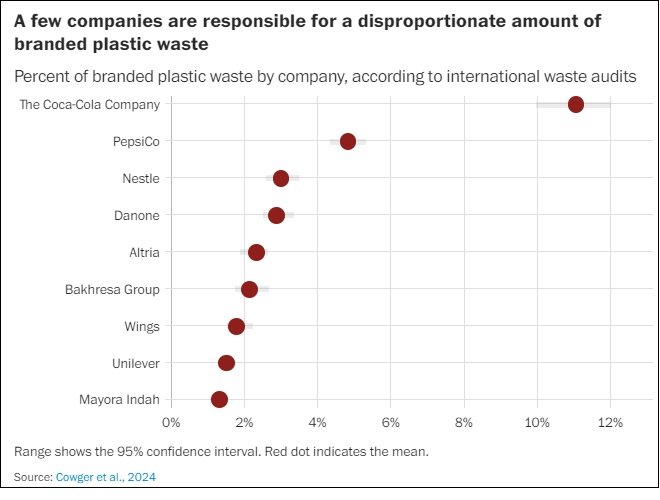
|
|

|
|
| May 4, 2024 |
|
A global study just revealed the world’s biggest known plastic polluters 
Every year, companies produce more than 400 million metric tons of plastic. Some of that plastic spills onto waterways or beaches, clogging streams or floating in huge gyres in the ocean. Some of it breaks down into tiny microplastics or nanoplastics that float in the air and enter human lungs, blood and organs.
Sometimes it’s hard to know which companies are behind all this plastic — but now, scientists have identified some of the largest contributors. A new study published Wednesday in the journal Science Advances has pinpointed some of the major brands responsible for plastic pollution across six continents. The researchers, who used a team of over 100,000 volunteers to catalogue over 1.8 million pieces of plastic waste, found that 56 companies were responsible for more than 50 percent of branded plastic waste globally. The largest contributor was Coca-Cola, which accounted for 11 percent of the branded plastic pollution worldwide. The findings, researchers say, reveal the enormity of the planet’s plastic pollution problem. “This is a herculean effort we have to do,” said Win Cowger, a research director at the Moore Institute for Plastic Pollution Research and the lead author of the study. “There are no easy fixes.” Out of more than 1.8 million pieces of plastic surveyed, close to 910,000 had visible brands. (Plastics can lose their brand markers through exposure to sunlight and weather.) And of those hundreds of thousands of pieces of plastic, the top companies responsible were Coca-Cola, PepsiCo, Nestlé and Danone. In an email, a spokesperson for the Coca-Cola Company pointed to the company’s World Without Waste strategy, noting that it aims “to make 100% of our packaging recyclable globally by 2025 and to use at least 50% recycled material in our packaging by 2030. ... We know more must be done and we can’t achieve our goals alone.” Nestlé said in an email that the company aims to reduce its use of new plastic by one-third and incorporate more recycled content into its packaging. PepsiCo declined to comment, and Danone did not respond to a request. The researchers also found that there was a direct relationship between a company’s production of plastic and the amount of branded plastic waste found in the environment. If a company such as PepsiCo produced 1 percent of the world’s plastic mass, for example, that company was responsible for roughly 1 percent of the waste found in the audit. If a company produced 0.1 percent of the world’s plastic mass, it was responsible for 0.1 percent of the waste. To the researchers, that finding means that recycling and waste management alone isn’t enough to manage the plastic problem. Global leaders and negotiators are gathering in Ottawa this week to hammer out a global plastics treaty. Many environmental groups and countries are looking for an agreement that will include cutting the amount of plastic production, a goal that U.S. negotiators have resisted. Industry groups and companies say that “circular plastics,” advanced recycling and waste management can solve the problem without production limits. Plastic industry groups have also argued that plastics help boost the global economy. According to a study commissioned by an industry group, limits on production would disproportionately affect low-income people. Plastics, which are made from fossil fuels, have helped to buoy the fossil fuel industry even as climate policies take aim at the production of oil and gas. Plastic is projected to account for half of growth in oil demand by mid-century, according to the International Energy Agency. At the same time, scientists are rushing to understand the consequences of the tiny pieces of plastic that can enter the body and organs. While microplastics have been found in many systems of the body, their effects on human health are still unclear. Scientists say that without curbs on production, plastics will continue to accumulate in the environment — and in human bodies. “It’s been status quo for a long time,” Cowger said. “And it’s obviously not working.” (Source: The Washington Post) Story Date: April 25, 2024
|